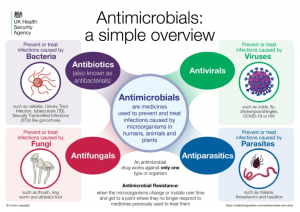Antimicrobial resistance (AMR) is a growing global health threat that disproportionately affects low- and middle-income countries (LMICs) and vulnerable populations, including young children, older adults, and refugees. Effective antimicrobials are essential for both human and animal health, yet access to these life-saving drugs is becoming increasingly limited. The 2024 UN General Assembly meeting on AMR provides a crucial opportunity to revisit and strengthen global commitments to combat this threat.
Further reading: IDA Highlights: TB vaccines

Figure 1: The national annual report ESPAUR (English Surveillance Programme for Antimicrobial Utilisation and Resistance) outlines the scale of the problem and this blog reflects its latest findings, as well as the actions we can all take to mitigate the effects of AMR.
One of the key points raised in the UN meeting is the need for stronger, resilient health systems, particularly in LMICs. These systems should include universal health coverage and reliable access to antibiotics, sanitation, and hygiene measures. Without these fundamental components, it will be difficult to curb the rise of AMR. Equally important is the need for robust surveillance systems to generate reliable data on antibiotic use and resistance patterns. Currently, many LMICs lack the laboratory capacity to conduct proper surveillance, which hampers evidence-based policy making and follow-up actions.
Moreover, the report emphasizes that efforts to reduce AMR should go beyond focusing solely on death rates. Avertable infections, which can significantly affect hospital stays and patient outcomes, should also be prioritized in national targets. Improving antibiotic stewardship in both human and animal health is another critical area that requires attention. While responsible use of antibiotics is important, it must be complemented by enhanced infection prevention and control measures to prevent the spread of resistant bacteria.
The UN General Assembly’s political commitment is a step in the right direction, but it must be backed by sufficient resource mobilization at both national and global levels. High-income countries need to allocate domestic resources to mitigate the effects of AMR, while resource-constrained countries require international support to implement their National Action Plans.
The meeting provides a renewed sense of urgency for countries to act and hold themselves accountable to global goals. By aligning national targets with global commitments, we can ensure that the progress made is meaningful and sustainable.
Journal Article: Forssmed J. “Antimicrobial Resistance: Now is the Time to Revisit Global Commitments.” The Lancet, 2024. https://www.thelancet.com/journals/lancet/article/PIIS0140-6736(24)02140-8/fulltext
Summary by Faith Oluwamakinde




